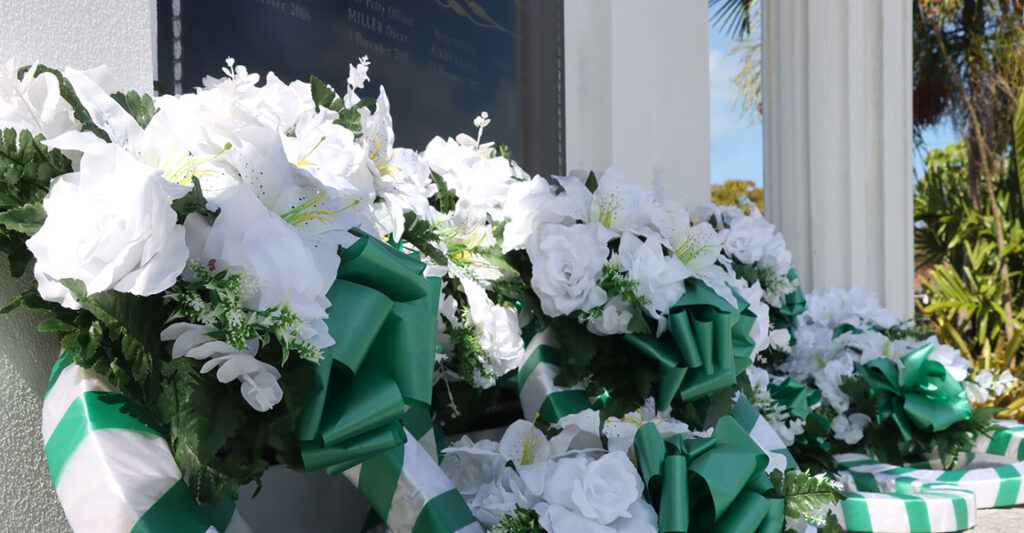The Royal Bahamas Defence Force recently commemorated the May 10, 1980, deaths of four Marines, who were killed after their patrol boat, the HMBS Flamingo, was attacked by Cuban warplanes. ROYAL BAHAMAS DEFENCE FORCE
THE WATCH STAFF
May 10th marked the 44th anniversary of the tragic 1980 sinking of the HMBS Flamingo – a Royal Bahamas Defence Force (RBDF) patrol vessel – by the Cuban military, which killed four Bahamian Marines and galvanized the RBDF to develop into the capable, resilient force it is today. The unprovoked attack on the Flamingo by Cuban MiGs, which occurred after the patrol boat had intercepted two Cuban fishing boats stocked with illegally harvested fish and seafood, sent shock waves throughout the region and mobilized United States and United Kingdom military responses and search and rescue operations. Although 19 members of the Flamingo’s crew survived and the Cuban government eventually took responsibility for the attack, paying restitution to the victims’ families, the incident deeply affected the RBDF and the Bahamian people.
In a commemorative ceremony on May 10, 2024, the RBDF honored their fallen comrades with a military gun salute and a wreath-laying at Coral Harbour Base, the RBDF headquarters. National Security Minister Wayne Munroe, K.C., spoke to family members of the victims and several government ministers and high-ranking officials, including RBDF Commodore Raymond E. King and Police Commissioner Clayton Fernandez, as well as RBDF senior officers and Marines and representatives from other government agencies, according to an RBDF news release.
Munroe said the fallen Marines — Fenrick Sturrup, Austin Smith, David Tucker and Edward Williams — represented the highest ideals of sacrifice and service. Their bravery should be an example of hope and inspiration in the face of adversity, he said. Family members, along with Munroe, placed wreaths at a memorial commemorating the incident. The ceremony ended with the wreaths being placed in the waters by the base to honor the fallen Marines and all those who lost their lives at sea.
“These men gave their lives in service to country. We salute them, and we cherish their memories as we remain committed to Guarding Our Heritage,” the release stated.
The RBDF had only been in existence for about six weeks when the 34-meter Flamingo encountered two Cuban fishing vessels near Cay Santo Domingo in the southern Bahamas. The Cuban fisherman tried to escape until warning shots were fired. When the Marines boarded the vessels, they found 1,361 kilograms of fish, lobster, conch and stone crab. The Flamingo seized the boats and began towing them to Cay Santo Domingo for additional examination, according to the Nassau Tribune, a Bahamian newspaper. That’s when two Cuban MiG fighters began strafing the Flamingo, which began to sink. Cmdr. Amos Rolle ordered his men to abandon ship and most crew members made it to one of the fishing boats as the Cuban warplanes continued to strafe the area. Despite search and rescue efforts by U.S. and Bahamian rescue teams, the four Marines were never found.
Once Cmdr. Rolle and his surviving crew — along with eight Cuban fisherman — reached Duncan Town about five hours later, Cuban jets, a military transport plane and a helicopter arrived. The helicopter landed on the beach next to the vessels, although no Cubans disembarked onto Bahamian soil. The Cuban aggression frightened many Bahamians, who feared an invasion ordered by then-Cuban dictator Fidel Castro. Eventually, the Cuban forces departed without further violence. Meanwhile, the U.S. dispatched a Coast Guard helicopter from Puerto Rico to help in the rescue and a Navy destroyer was also sent to the area. A British warship also arrived to provide additional support to their Bahamian partners.
At the time, Castro was facing strong dissent at home in the midst of the massive emigration of Cubans to the U.S. in the Mariel boatlift between April and October 1980. At first, Cuba accused the RBDF of acting on behalf of the CIA, but later backtracked, expressing regret for the incident and paying $10 million as compensation to the victims’ families. The Cuban government later said the MiG pilots had acted “without authorization.” The Flamingo tragedy galvanized the Bahamas to greatly expand its military forces and seek closer relations with the U.S. and other international partners committed to a rules-based international order.

